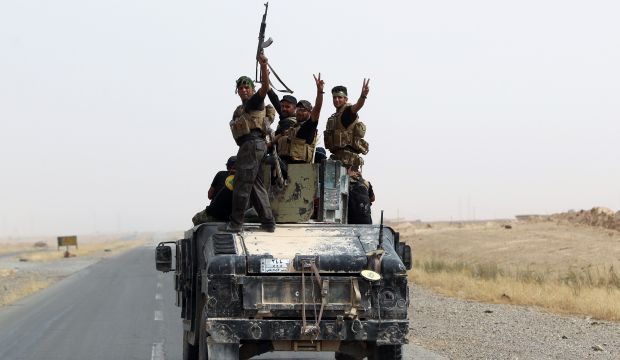
Iraqi Shiite fighters from the Popular Mobilization forces ride on a military Hummer in the town of Baiji, north of Tikrit, as they fight alongside Iraqi forces against the Islamic State of Iraq and Syria (ISIS) on June 10, 2015. (AFP/PHOTO / AHMAD AL-RUBAYE)
The White House on Wednesday authorized deployment of up to 450 troops to assist beleaguered Iraqi forces trying to recapture the city of Ramadi, the provincial capital of Anbar, that fell to the Islamist group last month.
US troops will do almost everything, from advising to training, but will not engage in combat, Obama said on Thursday.
Speaking to Asharq Al-Awsat Sheikh Naim Al-Kaoud, head of the Sunni Albunimr tribe, said: “If the 450 troops will come to fight, thousands of fighters have already failed to confront ISIS.”
Al-Kaoud blamed the collapse of Ramadi on “the absence of a real intention to drive out the Islamist militants” on the part of the Iraqi government.
“The government and the general command of the Iraqi Armed Forces dispatch officers whose only concern is to make personal gains at the expense of Iraq,” he added.
Another tribal leader has expressed doubts about the significance of Washington’s new plans, which also include building more US military bases, as long as the Baghdad government refuses to arm Anbar’s tribes.
“We have been begging the [Iraqi] government to arm [tribal] volunteers, to no avail,” the head of Anbar’s Albufahd tribe, Sheikh Rafie Al-Fahdawi said.
He added: “We welcome the decision, but the question is: Where have all the weapons and aid provided by the US, European and Arab countries as well as Iran gone?”
Sunni tribal militias from the region have long complained of marginalization from Prime Minister Haider Al-Abadi’s government in Baghdad, which they say has been more intent on arming the Popular Mobilization forces, a Shi’ite-dominated group of volunteer militias, at the Sunni militias’ expense.
He said: “Tribal volunteers fight ISIS with light weapons which they buy with their own money.” The prominent tribesman said Sunni volunteers have not received any salary payments from the government since the war on ISIS started seven months ago.
Others dismissed the step as “ineffective,” arguing that the 3,000-odd US troops already operating in Iraq have failed to halt ISIS’s progress.
Speaking to Asharq Al-Awsat, security and military expert Abdul Kareem Khalaf said: “The US army has 3,000 troops in Iraq. What did they do when ISIS militants managed to spread across Iraq?”
He said: “The deployment process serves a political rather than a military goal. What is required now is to intensify intelligence efforts on the ground in order make airstrikes more effective.”
US Army Gen. Martin Dempsey, chairman of the Joint Chiefs of Staff, told reporters on Thursday the White House was considering building more military bases in Iraq, a step which he admitted may require the deployment of additional forces.
